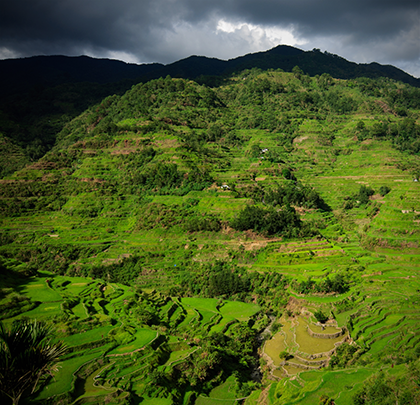ABM Archive Website
THIS WEBSITE CONTAINS ARCHIVE MATERIALS FOR HISTORICAL REFERENCE ONLY
For up-to-date information, including our latest appeals, news, and resources, please visit our current website.
Philippines: Economic Empowerment update
February 2017
The Journey of the Dagadag Farmer’s Association*
 |
| Vegetable terrace gardens in Banaue, similar to those in the Dagadag community. © Andrew Haimerl/Unsplash, 2017 |
Dagadag is a small community surrounded by rustling pine trees and vegetable terraces in the mountains of Benguet Province. Most of the people there are vegetable farmers now, tilling their own land in an area once gripped by controversial gold and copper mining exploits.
However, despite using well-proven conventional farming methods and yielding decent volumes of produce, these farmers are struggling. Competition from lower-priced imported vegetables is driving prices down, and farmers’ income is being severely affected. The prevalence of informal money lenders also puts farmers at risk, as high rates of interest quickly devour the small income that does come in. And as weather conditions become increasingly unpredictable and extreme, the certainty of harvesting a mature crop diminishes from year to year.
The Dagadag Farmers Association, as it is known today, was formed and organized when some of the struggling farmers learned about what the E-CARE Foundation was doing in a community nearby. Due to their earnest desire to improve their economic situation for their families and community, E-CARE agreed to begin a similar Asset-based Community Development project in Dagadag. After several months of community trainings and activities, including training in simple bookkeeping, the changes were becoming evident in the 24 members of the group. They have also successfully managed to register their association with the Department of Labor and Employment (DOLE) allowing themselves better and easier access to the services of government agencies. One member comments;
We learned a lot of things and gained additional knowledge that we can apply to ourselves and to others. Not only that, we can participate and [show support] in [the] community we live in for better improvement.
Today, the association is engaged in three business projects which are being managed by designated community officers, and are being patronized by the association members and other people in the community. These projects include rice trading, which began in September 2015, and a retailing business for rice and gas in March 2016. The association has also established money lending program under ECARE’s ‘Receivers to Givers’ program. This program provides an additional source of capital for the members’ vegetable production, allowing farmers to escape the burdensome rates of interest imposed by other money lenders and loan sharks. This is not only a blessing to the families of Dagadag, but also clearly demonstrates that through collective action and the identification of existing strengths, communities can bring themselves out of poverty.
The Dagadag Farmers Association are now looking forward, and developing plans for expansion;
Firstly, giving an incentive to [elected] officers for keeping our association’s unity, for their efforts of hard work and the time they allotted unconditionally.
Second is to extend financial support [by providing payable loans with lesser percentages of interest to] those who are in need within the community.
Third is to share our knowledge on how to create and manage a successful association within the community to help [others] form their own and to uplift their socio-economic condition for a contenting quality of life.
Finally, if God [wills], we plan to make [and sell] potato cookies as a source of additional income by producing such palatable goods out of our own products.”
“In this rapidly growing economy, we need plans in the future to be able to compete and meet the goals of our association in service for the betterment of the community.”
ABM would like to thank the Australian Aid program and all our generous supporters of the Economic Empowerment project. Your belief in this work is enabling many rural communities like Dagadag to escape the cycle of poverty, using their own resources and assets to facilitate their own development.
*This update was based on a report by Laiyan Padang and Luke Bagano, Episcopal CARE Foundation staff members
< Back


